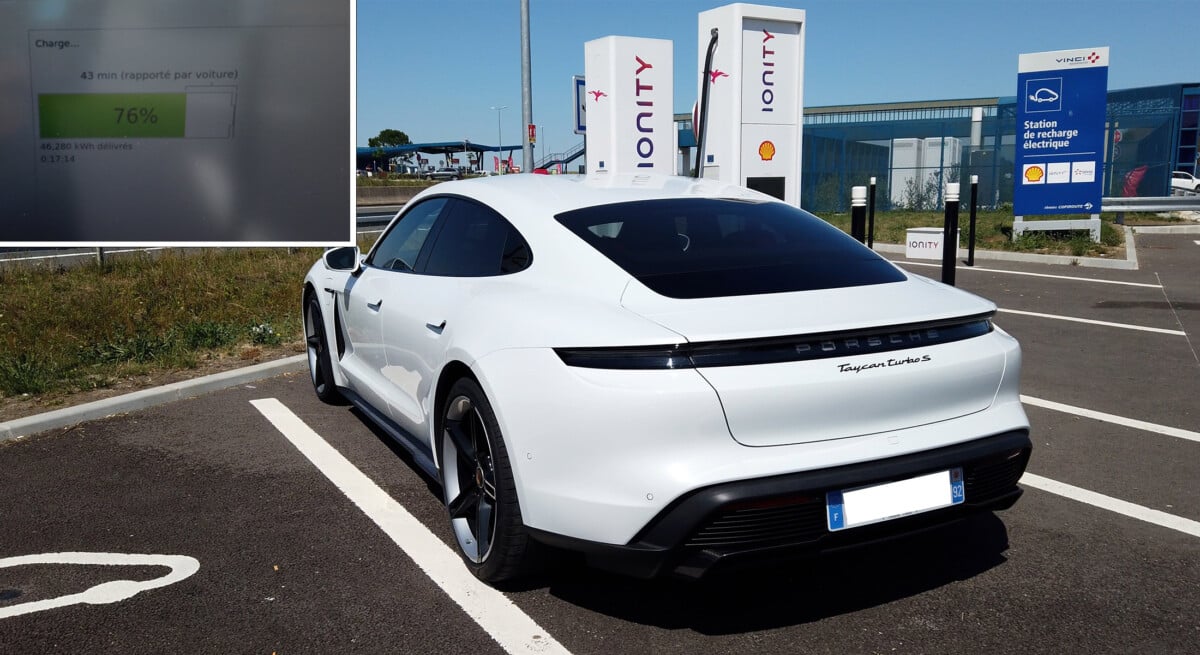By moving from a per-minute pricing to a price to be paid according to the quantity of energy delivered, Ionity is far from being of service to many electro-motorists. Indeed, the majority of Ionity users will ultimately find themselves losers in this change. Explanations.
Historically, Ionity is on its third pricing change. When it was introduced, the charge was a flat rate, at 8 euros, regardless of the time spent and the energy delivered. Of course, this tariff was not going to last. And about a year later, in France, Ionity introduced a rate per minute: 0.79 euro for 350 kW terminals, and 0.39 euro for 50 kW terminals. Thus, depending on the maximum power accepted by your vehicle, you could make big savings compared to a thermal vehicle, but this is no longer possible today, unfortunately.
From 5 to 15 euros for 100 kilometers of motorway
Until now, vehicles with fairly high fast charging power (Tesla Model 3 and Model Y, Hyundai Ioniq 5, Kia EV6 or even Porsche Taycan) had every interest in using Ionity, even when paying full price. With a price displayed at 0.79 euros per minute, 15 minutes of charging cost less than 12 euros. This allowed them to easily cover 200 kilometers of motorway, which amounts to considering a cost per 100 kilometers under 6 euros.
A thermal vehicle should consume less than 3 liters of gasoline per 100 kilometers to arrive at a comparable price, which is quite unrealistic, showing once again that electric vehicles are even more economical on long journeys. But this is no longer really relevant, unfortunately.
Indeed, considering an average consumption on the motorway of 20 kWh per 100 kilometers, with the new pricing at 0.69 euro per kilowatt hour, 100 kilometers recharged on the Ionity network can cost 13.80 eurosor the equivalent of approximately 7 liters of gasoline.

This tariff per kilowatt hour rather than time spent becomes advantageous only for vehicles recharging at an average power of less than 69 kW, which ultimately corresponds to a small minority of electric cars found on long journeys. The Tesla, Hyundai Ioniq 5 and other Kia EV6 could use and abuse small fast charges on the Ionity network, even paying the full price of 0.79 euros per minute, and get by with a relatively low cost per 100 kilometers . Nowadays, this is no longer possible.
50 kW terminals that are becoming cheaper, but…
The new Ionity pricing brings the consortium’s 50 kW stations down to 0.39 euros per kilowatt hour, which will allow certain vehicles to minimize the cost of their recharge, especially if they do not have the capacity to charge much faster than 50 kW average. This is the case for example of the MG ZS EV, or the Renault Zoé, which will have every interest in using these 50 kW terminals to limit the bill.
The problem is thatthere is only one terminal of this type at each Ionity station (compared to 4 to 8 350 kW terminals), and that it is becoming much more attractive than before, even for vehicles that can charge very quickly. Indeed, those who wish to take a long meal break at a service area where an Ionity station is located can easily cut their bill in half, simply by plugging into the 50 kW terminal.
For Tesla vehicles in particular, there was a financial interest in going to Ionity at the rate per minute compared to the brand’s Superchargers which cost around 0.50 euros per kilowatt hour, but this is no longer the case. This price change comes at the dawn of the great summer transhumance periods, and there is no doubt that both Ionity stations and Tesla Superchargers will be used consistently during the summer. Beware of the bill, which in one case as in the other, will never have been so high for many.
Below, you will find some examples of rates before and after the change in billing method at Ionity. We relied on the charging times given by the manufacturer to go from 10 to 80%, as well as the battery capacities usable by the owner. For a BMW i4 with an 82 kWh battery for example, and a charging time of 30 minutes to go from 10 to 80% battery, this gives 23.70 euros in pricing per minute, and 39.61 euros in pricing per kilowatt hour.
| Vehicle | 10% – 80% per minute rate | 10% – 80% at the rate per kWh | Cost difference |
|---|---|---|---|
| Tesla Model 3 or Model Y | €23.70 | €36.23 | + 53% |
| Audi e-Tron | €23.70 | €44.92 | + 90% |
| Hyundai Ioniq 5 or Kia EV6 | €14.22 | €36.23 | + 155% |
| Kia e Niro | €42.66 | €30.91 | – 27% |
| Peugeot e2008 | €23.70 | €24.15 | + 2% |
| Mercedes EQS | €23.70 | 52,16 € | + 120% |
| Renault Megane e-Tech | €51.35 | €28.98 | – 44% |
| BMW i4 | €23.70 | €39.61 | + 67% |
As you can see from the table above, the big losers of this price change see their bill almost double, if not more for the Hyundai Ioniq 5 and Kia EV6, while the winners like the Kia e-Niro or Renault Mégane e-tech sees only a small drop in their bill. For these vehicles in particular, charging on a 50 kW terminal will be of great interest: as they do not charge very quickly in any case, they will not waste much time using a 50 kW terminal, but their bill will be almost divided by two.
To follow us, we invite you to download our Android and iOS application. You can read our articles, files, and watch our latest YouTube videos.


